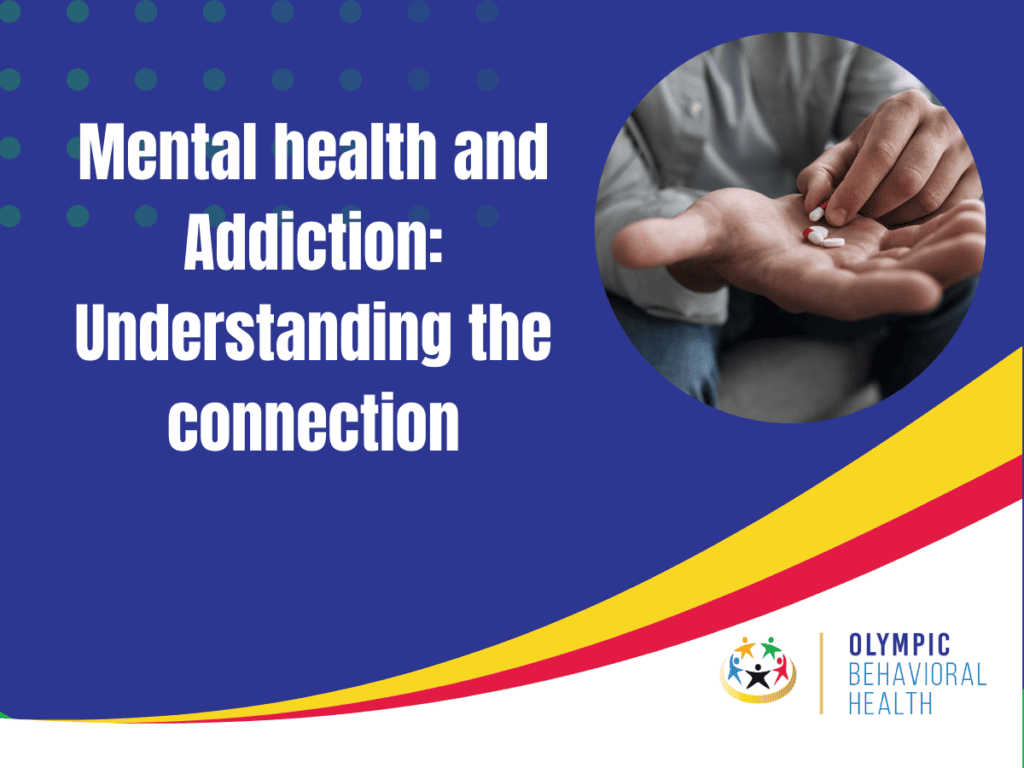There is a complex relationship between mental health and addiction. Mental health issues tend to lead to addiction problems and vice versa. For example, drugs often become the escape for people struggling with mental health issues and alternatively, addiction problems can lead to mental health issues or make them worse.
There is growing awareness about the relationship between mental health issues, thanks to the work done by reputable organizations like the National Institute on Drug Abuse and the World Health Organization. However, stigmatization is still common around these issues, discouraging people who need help from speaking up because they are afraid of being shamed or judged.
Understanding the connection between mental health and drug abuse is important in providing support to people who need help. If you have these issues, know that seeking help is not a sign of weakness. There’s no need to be ashamed as both conditions are treatable.

What is Mental Health?
To understand the connection between mental health and addiction, a proper understanding of mental health and some common health disorders is required.
The state of well-being in which a person recognizes their abilities, is able to handle the usual stresses of life, works productively, and is a fruitful member of a community is known as mental health. It’s a state of wellness that affects our emotions, psychology, mind, and social life.
Common Mental Health Disorders
Varying mental health disorders are experienced by people. The duration and severity vary significantly, with some people dealing with more than one mental health disorder at a time. Some common mental health disorders are discussed below:
Anxiety disorders: anxiety disorders are very common mental issues. Each disorder in this category has unique symptoms but persistent, excessive fear in non-threatening situations is a common theme for all of them. Social anxiety disorder and panic disorder are examples.
Depression: lingering feeling of sadness, lack of interest in activities, and hopelessness are key features of depression. Physical patterns such as changes in sleep pattern and appetite are equally often presented.
Bipolar disorder: people with this disorder experience unusually intense emotions, abnormal changes in energy level, sleep patterns, mood, and the ability to do what they need to do daily.
Post-traumatic stress disorder (PTSD): if an individual has a life-threatening or extremely frightening experience, PTSD can develop. Nightmares, flashbacks, overwhelming thoughts about the trauma, and severe anxiety are common symptoms of PTSD.
Schizophrenia: this is one of the most serious mental health disorders. Illogical or incoherent thoughts, hallucinations or delusions, and strange speech or behavior are common features of schizophrenia.

Understanding Addiction
Having discussed what mental health is and common mental health disorders, it is also imperative to provide brief insight into the fundamental aspects of addiction before discussing the complex connection between them.
Addiction is a chronic disease that alters the reward system of the brain, hence making it very difficult or impossible for individuals to control the use of a substance. The longer this continues, the harder it gets to gain control, even in the face of obvious adverse effects. Professional help is needed, in almost 100 percent of the cases, to break free from this complex condition.
A wide range of substances are addictive in nature but some are more commonly linked with addiction. They include: alcohol, legal and illegal drugs (benzodiazepine, cocaine, heroin, opioids, etc.), tobacco, behavioral (sex, gambling, Internet, etc.).
The Connection Between Mental Health and Addiction
The relationship between addiction and mental health is convoluted, not a one-way link. Where one exists, you are most likely to see the other and the influence they have on each other varies. It’s such a complicated relationship that even experts admit establishing which one causes the other can be difficult, just like the ‘egg-chicken’ connection.
What is Co-occurring Disorder?
Co-occurring disorders, also known as dual diagnosis, is when an individual is dealing with both mental health and addiction issues at the same time. It is, in fact, a very common condition. In 2016, the United States had about 8.2 million individuals battling with Co-occurring Disorders, according to data released by the Substance Abuse and Mental Health Services Administration.
While each condition, mental health or addiction, has its peculiar symptoms, diagnosing and treating co-occurring disorders can present a unique range of challenges because the symptoms of one can be masked by the other. Hence, treatment will be focused on the symptoms diagnosed while the others are doing more damage, rendering treatment ineffective.

How can Mental Health Influence Addiction?
Individuals with mental health disorders are very vulnerable to addiction. The symptoms of mental health disorders can be overwhelming, hence people often resort to using substances for relief, regardless of how temporary it is. For them, it’s a form of medication but the danger of these temporary relief givers is that dependency can set in. The more the substance is used, the higher the tolerance and the more the quantity needed for the same effect. Ultimately, it could end up as a fully fledged addiction.
For instance, individuals with anxiety disorders are likely to use sedatives to calm nerves, while people battling depression are likely to turn to alcohol.
How Can Addiction Influence Mental Health?
When some substances are used for a long period, they alter brain chemistry and ultimately trigger symptoms of mental health disorders. For instance, anxiety disorders can be caused by prolonged use of stimulants.
Therefore, addiction and mental health issues is a vicious cycle – addiction triggers mental health issues which in turn cause more substance abuse or mental health issues trigger addiction which in turn lead to more mental health issues.
What are the Roles of Mental Health in Recovery?
The role of mental health in addiction recovery is germane. The interconnected risk factors between them means one can trigger the other. Hence, the recovery journey of someone battling mental health issues will be more difficult. Underlying mental health issues must be addressed for the recovery to be effective and with much lower risk of a relapse.
What Are the Challenges of Co-occurring Disorders in Recovery?
As stated earlier, unique challenges are often presented by Co-occurring Disorders in diagnosis and treatment. The challenges include:
Diagnosis difficulty: a delay or difficulty in diagnosing and treating mental health and addiction can happen because their symptoms tend to overlap, which makes distinguishing them a difficult task.
Higher risk of a relapse: the risk of experiencing a relapse is higher for individuals battling a dual diagnosis. Any symptoms of either of them left untreated can trigger a relapse of the other. For instance, if some symptoms of mental health are left untreated, there’s a very high risk it will trigger addiction despite treatment, and vice versa.
Complex treatment is required: the symptoms of both addiction and mental health disorders must be treated, hence a comprehensive treatment approach must be used. Usually, a multidisciplinary team has to work together for effective treatment.
Longer treatment period: the need for a comprehensive treatment approach often developed by a multidisciplinary team ultimately lead to longer treatment periods. Longer treatments also present challenges because affected individuals may get tired. However, it’s imperative the treatment is comprehensive, otherwise a relapse is most likely. A wide range of support structures are provided to keep affected individuals going.
What are the Treatment Approaches for Co-occurring Disorders?
Comprehensive treatment approaches that address the symptoms of both addiction and mental health disorders are vital for effectiveness. Some of the treatment approaches that have been found to be effective are:
Integrated Treatment
This approach entails coordinated efforts from multidisciplinary professionals. Together, they come up with and implement a unified treatment plan, according to the unique needs of individuals. Addiction specialists, psychologists, psychiatrists, and social workers are key members of this multidisciplinary team.
Dual Diagnosis Treatment
This treatment usually involves a combination of therapies that recognize the specific needs of individuals. Medication, psychotherapy, and support groups are common therapies used here. Strategies that aid life skills improvement, stress management, and healthy relationship building are also often added for effective treatment. Everything done here acknowledges that both conditions have to be treated.
Cognitive Behavioral Therapy (CBT)
This psychotherapy has been used by experts to treat both addiction and mental health disorders and the results have been impressive. The aim is to help people comprehend and change thought patterns causing destructive emotions and behavior.
With CBT, triggers causing substance abuse can be identified, coping strategies can be developed for craving management, and skills vital for managing the symptoms of mental health disorders can be learned.
Note: all treatment approaches discussed above address both addiction and mental health disorders based on the understanding of their connection, a very important factor for effective treatment.
How important is early intervention?
Identifying and treating mental health disorders and addiction early makes a major difference in the severity and duration of these conditions. When the signs and symptoms are identified early, treatment and recovery are expected to be easier.
How important are support systems in recovery?
A recovery journey can be very tough and overwhelming. People in this process need all the support they can get. Being on this journey with the support of families, friends, experts, and others recovering as well enhances the effectiveness of the process. The emotional support received and accountability seen in support systems reduce the chance of a relapse.
Coping Mechanisms for Mental Health Disorders and Addiction
One of the things required for effective management of addiction and mental health disorders is coping mechanisms. It helps to avoid triggers, navigate stressful situations, and stay on course in the recovery process. Coping mechanisms have to be healthy. Examples include:
Healthy eating habits: healthy eating habits can influence mental health significantly.
Healthy sleep pattern: getting enough sleep, especially at night, is important for mental health. Withdrawal symptoms like cravings are lowered.
Mindfulness and meditation: they help to reduce anxiety and depression by promoting staying focused and present.
Creative outlets: writing, painting, and playing a musical instrument are common creative outlets, allowing emotional expression and a positive distraction.Exercise: stress can be managed and our mood improved through physical activities.
What can you do to prevent an overdose?
One important step in preventing a drug overdose is seeking treatment for addiction. By addressing the underlying factors that lead to substance abuse, individuals can reduce the risk of a potential overdose. Additionally, it is important to monitor and properly use any prescribed medications, to avoid mixing different substances, and to educate oneself and others on the signs and symptoms of an overdose.
It is also crucial to have access to and know how to use a life-saving medication such as naloxone, which can reverse an opioid overdose. Further information on overdose prevention can be found in our article.
What are the effects of Addiction on a Relationship?
Addiction can have a significant impact on relationships, as it often leads to strained communication, trust issues, and emotional distance. An addicted individual may prioritize their substance or behavior over their partner, causing feelings of neglect and resentment. Additionally, the financial strain and unpredictable behavior associated with addiction can also damage relationships.
This can result in arguments, isolation, and a lack of intimacy. The constant turmoil and instability created by addiction can also lead to codependency and enablement in the relationship. Ultimately, addiction can jeopardize and even end relationships, making it crucial for individuals struggling with addiction to seek help and support for the sake of their loved ones. To learn more about the effects of a addiction in a relationship, see here.
Get help for your Addiction
Addiction Treatment at Olympic Behavioral Health offers help and support for those struggling with addiction. Taking the first step can be difficult, but it is crucial to call for assistance. Our facility in West Palm Beach provides comprehensive addiction treatment programs to guide individuals towards recovery. If you or your loved one is battling addiction, reach out to Olympic Behavioral Health today.
Olympic Behavioral Health Drug Rehab
Olympic Behavioral Health Drug Rehab in West Palm Beach is a place where healing begins. With compassionate professionals and a state-of-the-art facility in West Palm Beach, we understand that overcoming addiction is challenging. The first step is calling us, and we will provide the help and support you need on your journey to recovery.

Share This Post



